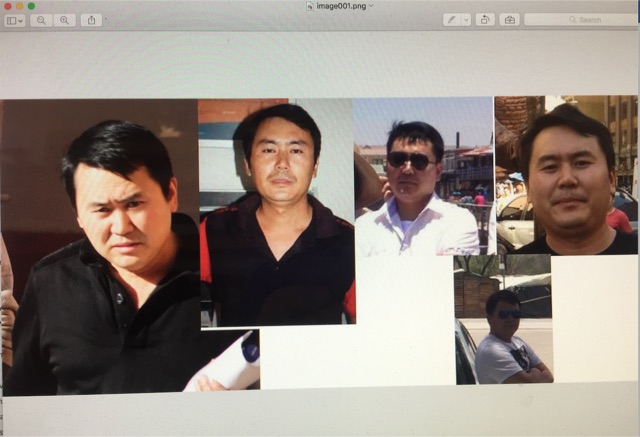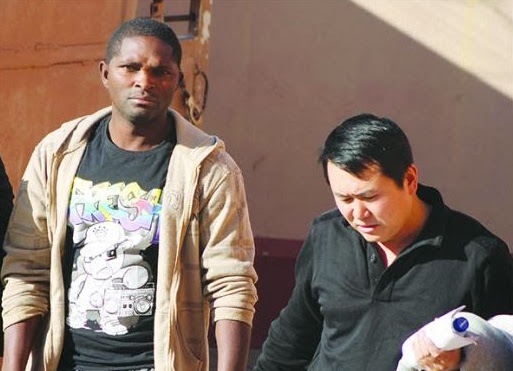
07 Feb Chinese ‘mafia boss’ turns to timber in Namibia
Xuecheng Hou, a wealthy Chinese businessman linked to wildlife contraband trafficking, has emerged as a major player in the illegal trade in rare African timber in sub-Saharan Africa. John Grobler investigates

The many faces of Xuecheng Hou
Evidence shows Xuecheng Hou and other timber traders are taking advantage of a legal loophole that allows rural Namibians to harvest slow-growing species such as African rosewood, mukula and bloodwood trees for their own use.
They harvest most of the logs in south-eastern Angola, Zambia and the Democratic Republic of the Congo (DRC), countries that have banned the export of raw logs, and then transport the timber by truck to Walvis Bay harbour in Namibia.
Using Namibia as their backdoor, they are exporting raw logs from the region at a rate of thousands of trees every month.
Currently, an estimated 250-300 containers of raw timber are leaving Walvis Bay for China every month, representing a region-wide decimation of a resource valued for its medicinal and nutritional properties. At around US$35,000 to $40,000 per container, this illegal trade is worth between $8.75-million and $16-million per month.

Raw logs being transported out of Cuando Cubango province in south-eastern Angola, where illegal logging has stripped the area of any valuable timber
Smuggling route
The wood-smuggling route is the same as that followed by the illicit trade in rhino horn, ivory and pangolin scales and skins, among others. Containers of illicit timber are often used to hide wildlife contraband, as a recent bust of one such trader with three tons of pangolin scale hidden in a container packed with wood from the DRC showed.
Hou’s New Force Logistics transport company – which is not legally registered with Namibia’s ministry of finance, or the ministry of trade and industry – has emerged as one of the largest players in this business.
Well-placed sources in the Walvis Bay shipping industry said he was a central coordinator for hardwood trans-shipments, and seemed to be acting as an agent for another China-based buyer. He was seen by two eyewitnesses during late December 2016 and early January 2017 at two industrial yards where illegal trans-shipping from open trucks to containers was taking place.
Hou denied that he was the central coordinator or was involved in buying any hardwoods, saying his company was handling the logistics on behalf of Angolan and Zambian clients. “I just do the transport and get my share,” he said.
When it was put to him that New Force Logistics was not registered and that he was making himself guilty of tax evasion, Hou insisted Oxpeckers speak to his lawyer, Khadila Amoomo, and ended the call.
Amoomo’s legal firm also represents two Chinese nationals caught recently in Windhoek in possession of two rhino horns, as well as Namibian businessman Mox Namwandi and co-accused Darius Shalukeni, caught last year with three rhino horns in their possession in a police sting operation. (See Blink king accused in Namibian rhino poaching.)

Xuecheng Hou’s accident-damaged Mercedes Benz parked at the Walvis Bay industrial property where he had been storing and re-packing hardwood. Hou denies that he is a buyer and says that he only was doing the transport
Industrial yard
Hou, currently on bail of R40,000 on two charges under the Controlled Wildlife and Trade Act, is a close associate of convicted rhino horn trafficker Wang Hui, it has been established in the course of a 30-month ongoing Oxpeckers investigation into wildlife trafficking in Namibia. Hui and three other Chinese nationals are serving 14 years in jail for attempting to smuggle 14 rhino horns to China in 2014.
Hou was identified as the person renting an industrial yard in Walvis Bay where raw logs were stored and trans-shipped into containers without local customs’ supervision, as required of legal in-bond facilities.
Hou’s accident-damaged Mercedes Benz with registration number N889 999W is still parked at this property that otherwise seemed abandoned by mid-January 2017. After his illegal operations at this site were exposed, he kept moving his operations to other industrial properties in the same area.
Seemingly irritated at the repeated exposure of his activities on social media by this reporter, he publicly insisted that people “… respect the government and its laws”, eventually lashing out with racial taunts and threatening “… to beat you and shit”.
Exotic hardwood is the single-most smuggled commodity in the world, according to the United Nations Office on Drugs and Crime. But because the trees were cut (albeit illegally) in Angola and the DRC, Namibian border officials have turned a blind eye to the abuse of transit permits and local forestry regulations forbidding the transport of raw wood to prevent the spread of borer-beetle and other pests.
The Namibian ministry of finance has launched an official investigation into the wood exports that have been booming since Mozambique and Angola late last year banned the export of any raw timber from their ports.
This belated action comes after the top forestry officials of Namibia, Zambia and Angola in August 2015 met in Windhoek and committed themselves to cracking down on the illegal timber trade. Namibia’s Director of Forestry, Joseph Hailwa, has so far not responded to any queries.
Import records show that most of the timber is exported from Angola, Zambia and the DRC by truck, entering Namibia as wood cargo in transit on temporary permits.
While Zambia has also banned the harvest of hardwoods on a commercial basis, the buyers exploit a loophole in Zambian law that allows local people to harvest hardwood trees for own use. These are then exported via local intermediaries of questionable legality, such as an internet café and a plumbing business, official records showed.

A week after social media posts, the yard was cleaned up and the car covered with plastic after all the packed containers were removed by In-Touch Cargo
Untouchable
In spite of having been arrested several times since 2004, Hou has cultivated a network of immigration, law enforcement and security company officials at Namibia’s main harbour and international airport. He has also stayed one step ahead of the law for 15 years now.
In each instance, his co-accused either took the blame solely upon themselves or disappeared after being granted bail, including in a June 2014 case when he and five others were arrested close to his Windhoek business premises with four elephant tusks in his car.
Hou at the time was out on bail on previous charges of possession of crocodile, zebra, leopard and monkey skins stolen from an Otjiwarongo taxidermy four months earlier.
Otjiwarongo is also where his associate Hui Wang has his businesses and where Hou has a rented house, it has been established in an investigation over the past 30 months.
A charge of illegal possession of cheetah skins was later added to Hou’s charge sheet when those were discovered at his offices in Windhoek’s China Town.
“He never should have been released on bail because of those previous offences,” said former state prosecutor Verinau Kaneheme, who opposed Hou’s bail application in the Windhoek Regional Court on February 16 2016.
During the hearing, it emerged that Hou was at one stage employed by the Centre for Resources and Transformation, an NGO run by the Swapo Women’s League. The centre runs community projects in Ruacana and Onamatanga in north-western Namibia, where the majority of rhino poachers arrested thus far hail from.
The presiding officer in Hou’s bail hearing, magistrate Jermaine Muchalife, however seized upon a slip of the tongue – “same crimes” as opposed to “similar crimes” – as grounds for dismissing the state’s case and granting Hou bail of N$30,000, recalled Kaneheme, now a magistrate himself.
The portly 40-year-old Hou had his first scrape with the law in March 2004, three years after he arrived in Namibia on a worker visa “…to research the vegetable market”, according to an affidavit he deposed in 2004 when opposing an official deportation order.
In it, he stated that “… the manageress of Ehafo, being my aunt (Hou Jun Ling), reported me to the Namibian police, Windhoek, by apparently alleging that I unlawfully took a certain machine from Ehafo. I vehemently deny any such accusation against me.”
How his aunt came to be employed by Ehafo, a state-subsidised agricultural foundation employing physically handicapped people, is not clear, as it went bankrupt not long after.
Hou, in a business plan for his vegetable farm filed in support of his affidavit, referred to an expensive weeding machine as part of his claimed USD$200,000 investment in Namibia.
The state attempted to deport Hou as an undesirable alien when he was arrested on August 18 2004 after he and one Yu Zin allegedly threatened businesswoman Ma Yin with a gun at the state-owned Windhoek Country Club and Casino. He denied such accusations in his affidavit.
What Hou omitted from his sworn statement was that his co-accused Yu Zin and two other Chinese, named Zhang Funang and Cui Cui, had earlier appeared in the same court on that same day on criminal charges of tax evasion, fraud and charges under the Justice of Peace Act for racketeering.
These were related to their possession of 200 grams of heroin and the seizure of thousands of counterfeit Peter Stuyvesant cigarettes hidden in a Windhoek warehouse earlier in 2004.
At the time, the Chinese community petitioned the Namibian government to deport Yu Zin and others like him: Yu two years earlier was paralysed from the waist down after being wounded during a shoot-out with automatic weapons at a Chinese wedding at the Windhoek Country Club and Casino.
Hou’s lawyer secured his client’s release and stay of deportation. Two months later, in early November 2004, Yu Zin was shot five times at point-blank range in his township shop by an unknown black assailant who fled the scene. No arrest was ever made in this case.
Hou denied that he was in any way involved or that he even was at the country club on that day, in spite of his being criminally charged and also referring to the incident in his own October 2004 affidavit.
With only Hou left in the accused stand, Ma Yin’s case against him collapsed.

Xuecheng Hou (right) and Congolese suspect George Mashala after they were arrested in Windhoek in 2012 for dealing in ivory. Photo courtesy The Namibian
Repeated arrests
Since then, Hou has flourished, in spite of his having been arrested repeatedly, including on charges of theft of cattle, solar panels and wildlife skins, and illegal possession of ivory.
On January 26 2005 he married a local woman from Ogongo in the rural Omusati region, so obtaining domicilium rights in Namibia. He is believed to be still married to another woman in China.
His Namibian wife (name withheld) claimed in an interview with the state newspaper New Era on December 1 last year that Hou had rushed the wedding, in spite of her being injured in an accident at the time. She said he had told her that he only married her to obtain Namibian citizenship and that there was nothing she could do because he was a “mafia boss”.
She also alleged that Hou repeatedly had tried to kill her. “He threatened to shoot me if I did not surrender our marriage certificate to him,” she said.
On November 26 2008, Hou and one Yang Zheng were charged with the illegal possession of a firearm in Windhoek. Charges against Hou were dropped after Zheng pleaded guilty on August 17 2009, and received a R2,000 fine.
In March 2010, Hou and one Samuel Kuhanga were arrested and charged after a spate of theft of cattle and solar panels from the Witvlei area, 200km east of Windhoek. Kuhanga in 2012 pleaded guilty in the Windhoek Regional Court and exonerated Hou, and was sentenced to two years in jail. He has since been released and was last known to be employed by the local franchise of an international security company in Swakopmund.
In the ivory case, Hou’s two co-accused, Ranjithkumar Ranjith (aka Kumar) and Shi Zhiwei, fled Namibia as soon as they obtained bail. A fourth accused, DRC citizen George Mashala, claimed at the last hearing on February 16 2016 that he did not know Hou at all.
And although Hou’s official passport has been confiscated as part of his bail conditions, police sources said he has frequently travelled to Zambia and Angola, calling himself “Jose Hou” on social media since becoming involved in logging in south-eastern Angola’s Cuando Cubango province.
Hou is known to have interests in several Chinese shops, a vegetable farm, brick-making business and, of late, a massive logging business specialising in African rosewood.
In spite of all this economic activity, he appears to have no bank accounts or fixed property registered in his own name, even after living in Namibia for more than 15 years now.
In 2010, he transferred 80% of his interest in his only registered business, Windhoek Vegetables CC, to two toddlers aged two and three. A further 10% interest was given to one Benjamin Tuyolengi (“BT”) Nangombe, whose financial records showed him to be a protocol officer attached to the Office of the President.
He is regularly seen in any number of a fleet of luxury cars and 4x4s, but none of those is registered in his own name. After he crashed his Mercedes Benz, he bought another Mercedes two days later, paying in cash as with most of his deals, said a former employee who worked for him as a driver for several years.
Investigators believe his vast business empire is controlled via other Chinese frontmen and enforcers in whose company he is regularly seen. One of them was positively identified by a retired Hong Kong policeman who specialised in organised crime as a member of the Chinese Triads by virtue of a distinct scorpion tattoo on his right wrist and hand.
Baobin Bian, an employee of convicted rhino horn trafficker Wang Hui, in 2015 told an undercover investigator that Hou was a close business associate of Wang Hui. Baobin also told the investigator that Wang and Hou operated wood export companies in Angola and Zambia.
A wine-red Jeep often used by both Baobin and Hui before his incarceration in fact belonged to Hou but was registered under someone else’s name, a former employee confirmed.
Under the Namibian Prevention of Organised Crime Act of 2004, all assets of suspected organised crime suspects may be seized by the state. A senior police investigator said he believes this to be the main reason for Hou’s non-existent financial profile.
Asked why so few of his businesses were legally registered, Hou said: “OK, so no company. But I no buy wood.”
He referred all further questions to his lawyer, Khadila Amoomo. No response from Amoomo was received at the time of writing, in spite of Hou undertaking that he would do so. – oxpeckers.org
John Grobler is an Oxpeckers Associate based in Namibia. This investigation was funded by the Open Society Initiative of Southern Africa. Prosecutorial editing support provided by Looking Glass
Read more about Xuecheng Hou’s poaching connections in A mysterious dead hand driving Namibia’s poaching
• See also Timber looting continues in Mozambique
